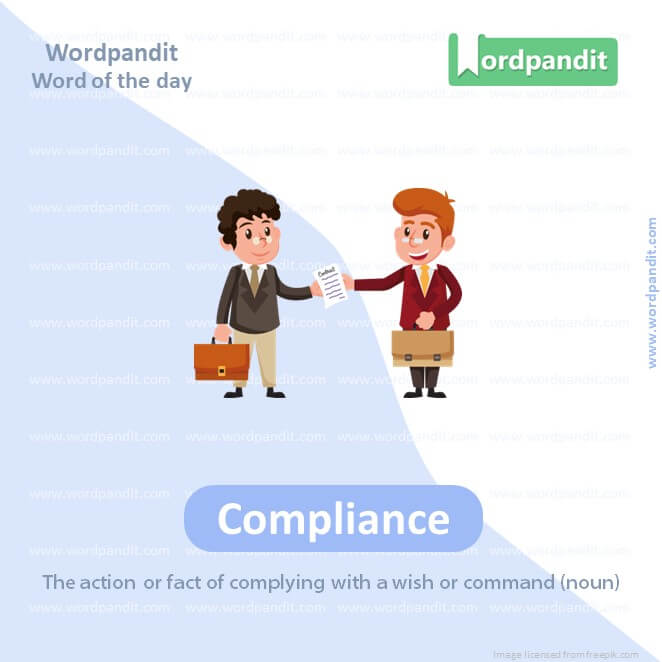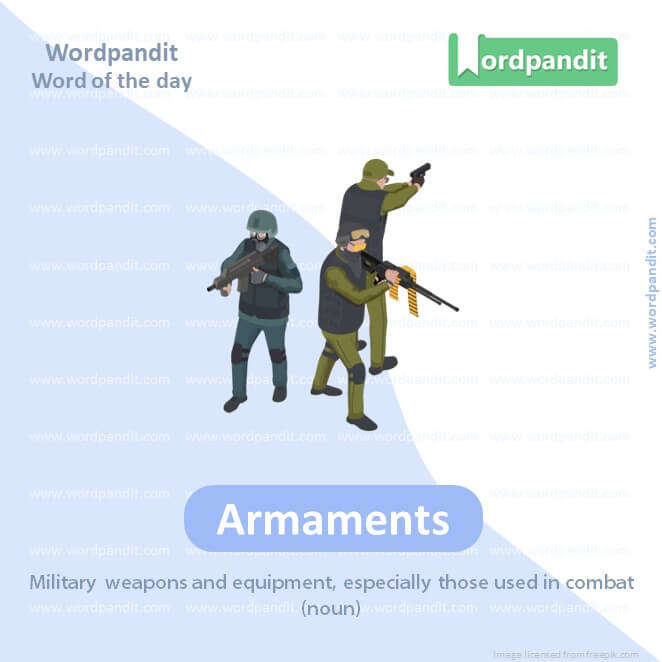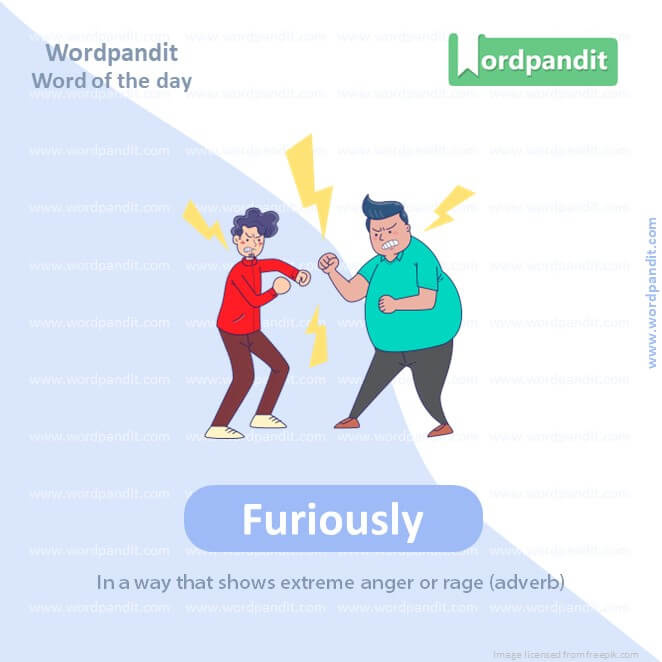Daily Vocabulary Words: List of Daily Used Words in Leading International Newspapers
Hi there. Welcome to this special section @ Wordpandit.
Our endeavour here is very simple: to highlight important daily vocabulary words, which you would come across in leading newspapers in the country. We have included the following newspapers in our selection:
• The New York Times
• The Washington Post
• Scientific American
• BBC
• The Guardian
• Psychology Today
• Wall Street Journal
• The Economist
We are putting in extensive work for developing your vocabulary. All you have got to do is be regular with this section and check out this post on a daily basis. This is your repository of words that are commonly used and essentially, we are posting a list of daily used words. Hence, this has significant practical application as it teaches you words that are used commonly in leading publications mentioned above.
Visit the website daily to learn words from leading international newspapers.
WORD-1: Inflicted
CONTEXT: 7 was an atrocity no nation could leave unanswered, and by hiding behind civilian fronts, Hamas violates international law and bears a major share of responsibility for the suffering inflicted on the people in whose name it purports to act.
SOURCE: The Hindu
EXPLANATORY PARAGRAPH: Imagine accidentally hitting your finger with a hammer while playing with tools. The pain you feel is because something caused harm or damage to you. That’s what “inflicted” means—causing something unpleasant or harmful to someone or something else.
MEANING: Caused something unpleasant or harmful to someone or something (verb).
PRONUNCIATION: in-FLIK-tid
SYNONYMS: Imposed, caused, dealt, delivered, administered, imposed upon
USAGE EXAMPLES:
1. The storm inflicted severe damage on the coastal town.
2. The virus inflicted suffering on millions of people worldwide.
3. Her sharp words inflicted emotional pain on her friend.
4. The accident inflicted injuries that required immediate medical attention.

WORD-2: Stepping
CONTEXT: The enormous danger facing the international aid agencies that are stepping in to help.
SOURCE: The Hindu
EXPLANATORY PARAGRAPH: Imagine walking up a staircase, taking one step at a time. Each time you lift your foot to move to the next step, that action is called “stepping.” It’s a basic movement of moving from one place to another by lifting and placing your foot down.
MEANING: The action of moving by lifting and placing one foot ahead of the other (noun).
PRONUNCIATION: STEH-ping
SYNONYMS: Walking, moving, advancing, proceeding, stepping, taking steps
USAGE EXAMPLES:
1. She heard the sound of footsteps approaching.
2. He took careful steps while walking on the icy path.
3. The dance routine involved intricate steps and movements.
4. The hiker carefully navigated the steep steps of the mountain trail.

WORD-3: Compliance
CONTEXT: The president and the secretary of state urging them to ensure that military assistance to Israel is in compliance with U.S. and international law.
SOURCE: The Hindu
EXPLANATORY PARAGRAPH: Imagine playing a game where you have to follow all the rules to play fairly. When you do exactly what the rules say, you’re showing “compliance.” It means following instructions or rules without resistance.
MEANING: The action or fact of complying with a wish or command (noun).
PRONUNCIATION: kuhm-PLY-uhns
SYNONYMS: Obedience, adherence, conformity, agreement, submission, cooperation
USAGE EXAMPLES:
1. The company policy required strict compliance with safety regulations.
2. Students must show compliance with the school’s dress code.
3. The criminal’s lack of compliance with the law led to his arrest.
4. Employees were trained on data compliance to protect sensitive information.

WORD-4: Armaments
CONTEXT: Any of its requirements are already law under the Foreign Assistance Act and other measures, and they apply to armaments supplied to other countries, including Ukraine.
SOURCE: The Hindu
EXPLANATORY PARAGRAPH: Imagine soldiers preparing for battle, carrying weapons like guns, swords, and shields. These tools of war, used for defense or attack, are called “armaments.” They are equipment or weapons used by a military force.
MEANING: Military weapons and equipment, especially those used in combat (noun).
PRONUNCIATION: AHR-muh-muhnts
SYNONYMS: Weapons, artillery, munitions, gear, equipment, arms
USAGE EXAMPLES:
1. The country increased its spending on armaments for national defense.
2. The arsenal was stocked with a variety of armaments for different situations.
3. Diplomatic talks focused on reducing the stockpiles of nuclear armaments.
4. The soldiers trained with advanced armaments for modern warfare.

WORD-5: Obsessing
CONTEXT: I perversely scroll through the news on my phone, I’ve had a comforting thought: Mr. Trump is probably obsessing, too.
SOURCE: The Hindu
EXPLANATORY PARAGRAPH: Imagine being so focused on something that you think about it all the time, even when you’re doing other things like playing or eating. That intense and constant thinking about one thing is called “obsessing.” It’s like having a favorite toy or game that you can’t stop thinking about.
MEANING: Constantly thinking about something, often to an excessive degree (verb).
PRONUNCIATION: uhb-SESS-ing
SYNONYMS: Fixating, preoccupied, consumed, absorbed, engrossed, immersed
USAGE EXAMPLES:
1. She was obsessing over her upcoming presentation, rehearsing it repeatedly.
2. His obsession with cleanliness had him obsessing over every speck of dust.
3. The detective couldn’t stop obsessing about the unsolved case.
4. The musician was obsessing over every note of the composition.

WORD-6: Furiously
CONTEXT: He seems to think about her, and the civil fraud case she brought against him, during the day, too — sometimes driven to post about her “big, nasty and ugly mouth,” or draft campaign emails about her “filthy hands,” which he seems to think are furiously casting a spell in the “witch hunt” against him.
SOURCE: [Source]
EXPLANATORY PARAGRAPH: Imagine feeling really, really angry, like when someone takes your favorite toy without asking. The strong and intense feeling of anger is what “furiously” means—being very mad or enraged about something.
MEANING: In a way that shows extreme anger or rage (adverb).
PRONUNCIATION: fyoor-ee-uhs-lee
SYNONYMS: Angrily, fiercely, vehemently, passionately, intensely, furiously
USAGE EXAMPLES:
1. She was furiously typing on her keyboard, trying to finish the report on time.
2. The coach yelled furiously at the players for their poor performance.
3. He slammed the door furiously after the argument.
4. The protesters marched furiously, demanding justice.
WORD-7: Comeuppance
CONTEXT: After years of demonizing women who refuse to do his bidding, he is getting a measure of comeuppance at their hands.
SOURCE: [Source]
EXPLANATORY PARAGRAPH: Imagine someone who always teases others and never gets in trouble for it. But one day, they tease the wrong person, and that person stands up to them. The punishment or consequences they face for their actions is called “comeuppance.” It’s like getting what you deserve after doing something wrong.
MEANING: A punishment or retribution that one deserves for their actions, especially after behaving arrogantly or unfairly (noun).
PRONUNCIATION: kuhm-uhp-uhns
SYNONYMS: Retribution, consequence, punishment, recompense, karma, payback
USAGE EXAMPLES:
1. After years of cheating, he finally faced his comeuppance and was expelled from school.
2. The villain in the story met a fitting comeuppance in the end.
3. She gloated about her success until her comeuppance humbled her.
4. The corrupt official’s comeuppance was long overdue.
WORD-8: Slightest
CONTEXT: I’m feeling the slightest bit more rested, with thoughts of Stormy Daniels on my mind.
SOURCE: [Source]
EXPLANATORY PARAGRAPH: Imagine trying to balance a tower of blocks, and even a tiny movement can make it collapse. That’s how delicate and sensitive something can be. When something is very delicate or small, like a tiny touch or movement, it’s called the “slightest.”
MEANING: The smallest or least amount or degree of something (adjective).
PRONUNCIATION: SLAHYT-ist
SYNONYMS: Smallest, least, tiniest, minimal, insignificant, faintest
USAGE EXAMPLES:
1. She couldn’t stand even the slightest noise when she was trying to concentrate.
2. He didn’t show the slightest interest in the topic of conversation.
3. The instructions were clear, leaving no room for the slightest confusion.
4. Any hint of the slightest criticism would upset her.
WORD-9: Passivity
CONTEXT: Replace passivity and hopelessness with frenetic activity, tinged with anger and resentment.
SOURCE: The context provided by the user.
EXPLANATORY PARAGRAPH: Imagine sitting quietly and not doing anything, like when you’re waiting for someone to finish talking. That lack of action or resistance is called “passivity.” It’s when someone doesn’t take an active role or doesn’t react strongly to something.
MEANING: Lack of action or resistance, often indicating acceptance or submission (noun).
PRONUNCIATION: puh-SIV-i-tee
SYNONYMS: Inactivity, inertia, submission, acquiescence, complacency, passivity
USAGE EXAMPLES:
1. The government’s passivity led to criticism for not addressing the issue.
2. Her passivity in the face of injustice surprised her friends.
3. The company’s passivity towards customer complaints resulted in a decline in sales.
4. He criticized the students’ passivity in the classroom, urging more participation.
WORD-10: Anonymized
CONTEXT: Nearly two-thirds of women in her most recent campus-representative survey of 5,000 students at an anonymized “major Midwestern university” said a partner had choked them during sex (one-third in their most recent encounter).
SOURCE: The context provided by the user.
EXPLANATORY PARAGRAPH: Imagine playing a game where you use a made-up name instead of your real one. That way, nobody knows who you are unless you tell them. “Anonymized” means making something anonymous or not revealing the identity of someone or something.
MEANING: Made anonymous or not identifiable by name (adjective).
PRONUNCIATION: uh-non-uh-mahyzd
SYNONYMS: De-identified, anonymized, pseudonymous, nameless, unidentified, anonymous
USAGE EXAMPLES:
1. The data was anonymized to protect the privacy of users.
2. Participants in the study were anonymized to ensure confidentiality.
3. Online forums often use anonymized usernames to maintain privacy.
4. The whistleblower’s identity was anonymized to prevent retaliation.
Vocabulary Exercises
In the language learning fitness regime, ‘vocabulary exercises’ are vital workouts that flex cognitive muscles. These exercises help reinforce new vocabulary, enhance memory, and promote active application. However, to reap the full benefits of ‘vocabulary exercises’, it’s crucial to tackle them with the right strategy and mindset.
To begin with, when approaching ‘vocabulary exercises’, it’s important to view them as opportunities to explore words’ usage. Completing these exercises isn’t simply about ticking off correct answers; it’s about deepening the understanding of the words in various contexts which aids in their active usage.
Leveraging technology can greatly enhance the efficiency of ‘vocabulary exercises’. Digital apps often provide a wide range of ‘vocabulary exercises’ that range from fill-in-the-blank exercises to match-the-column tasks. These digital platforms offer instant feedback and keep you engaged while turning learning into an interactive experience.
Incorporating ‘vocabulary exercises’ in your daily learning routine helps consolidate your vocabulary knowledge. Set aside specific time slots every day to commit to these exercises. Regular revisions steps up retention and keep the learning curve ascending.
Personalizing ‘vocabulary exercises’ also proves beneficial. This could involve creating your own sentences using the learnt vocabulary or drawing visuals that associate with each word. These personalized exercises stimulate more profound learning and enhance the recall ability.
To conclude, ‘vocabulary exercises’ are essential tools in your language learning toolkit. They provide a platform for active learning, promote better recall, and, when paired with technological tools, make learning more engaging and effective. Furthermore, incorporating these exercises into your daily routine and personalizing them heightens their impact. Remember, ‘vocabulary exercises’ are not merely tasks, they are stepping stones guiding you towards your language mastery goals.







